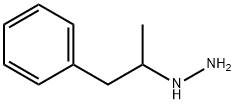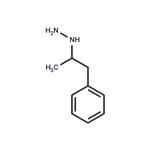Catron ,Lakeside, US,1959
ChEBI: Pheniprazine is a member of amphetamines.
A solution containing 741 g (5.0 mols) of 1 -phenyl-2-propylidenylhydrazine, 300 g (5.0 mols) of glacial acetic acid and 900 cc of absolute ethanol was subjected to hydrogenation at 1,875 psi of hydrogen in the presence of 10 g of platinum oxide catalyst and at a temperature of 30°C to 50°C (variation due to exothermic reaction). The catalyst was removed by filtration and the solvent and acetic acid were distilled. The residue was taken up in water and made strongly alkaline by the addition of solid potassium hydroxide. The alkaline mixture was extracted with ether and the ether extracts dried with potassium carbonate. The product was collected by fractional distillation, BP 85°C (0.30 mm); yield 512 g (68%).
The hydrochloride salt was formed in a mixture of 1:10 isopropyl alcohol:diisopropyl ether and recrystallized from acetonitrile, yield 87%, MP 124°C to 125°C.
Catron Hydrochloride (Marion Merrell Dow).
Poison by ingestion, intraperitoneal, subcutaneous, and intravenous routes. Human systemic effects by an unspecified route: visual field effects. Mutation data reported. When heated to decomposition it emits toxic fumes of NOx.

